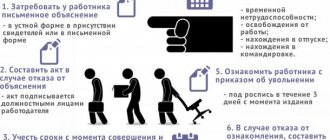Author of the article: Roman Gavrilov Last modified: January 2021 5679
Overworking of working hours is possible regardless of the type of schedule. Accounting for the time an employee spends at work is carried out in accordance with Chapter 15 of the Labor Code of the Russian Federation. The total length of the working week with a standard five-day schedule cannot be more than 40 hours per week (Article 91 of the Labor Code of the Russian Federation) and 120 hours per month. Due to production tasks, employees can work outside of their shift and remain at the enterprise to perform additional business tasks. Overtime is possible if the employee does not show up for a shift due to illness, additional time off, unplanned leave at his own expense, or terminates the employment contract at his own request or on the initiative of the employer.
Article 91 of the Labor Code of the Russian Federation - The concept of working time. Normal working hours
Working time is the time during which an employee, in accordance with internal labor regulations and the terms of the employment contract, must perform labor duties, as well as other periods of time that, in accordance with this Code, other federal laws and other regulatory legal acts of the Russian Federation, relate to working hours.
Normal working hours cannot exceed 40 hours per week. The procedure for calculating the norm of working time for certain calendar periods (month, quarter, year), depending on the established duration of working time per week, is determined by the federal executive body exercising the functions of developing state policy and legal regulation in the field of labor.
Article 99 of the Labor Code of the Russian Federation: general information
Before approaching the study of Article 99 of the Labor Code of Russia, it is necessary to understand the working time standards. These are units that are fixed both at the level of legislation and in the employment contract signed between the employee and the employer. For certain categories of citizens, special labor standards are established, for example, for the disabled, minors, pregnant women, etc.
Article 99 establishes provisions regarding the conduct of work activities outside the time limits established by labor legislation or a contractual agreement. This type of activity is called overtime. It can only be carried out with the consent of the employee himself. Coercion in this case is not allowed.
Overtime work is paid according to the law and in accordance with the rules established by the employment contract. As a general rule, every hour of such work is paid double.
However, it cannot be said with complete confidence that overtime is only voluntary. In exceptional situations, an employee may be forced to work in the following situations:
- To prevent disasters.
- During martial law.
- To ensure the livelihoods of the population, etc.
The enterprise must keep records of this kind of processing.
Reasons for engaging in recycling
Involving employees to work overtime is possible both on a voluntary basis and involuntarily. However, in both the first and second cases there are clarifications.
The reasons for involving an employee in processing may be the following:
- If there is an urgent need to complete important work that was previously started but not completed for production reasons;
- During forced repairs of mechanisms and buildings, the failure of which may lead to a global suspension of the work process;
- In case of non-appearance of the replacement employee, if the work is continuous.
By law, the employer is authorized to oblige an employee to perform overtime work without his written consent if the employee’s participation is required:
- In operational actions to prevent a disaster and eliminate the danger of an emergency;
- In order to eliminate disruptions in the supply of heat energy, hot and cold water, natural gas;
- In cases of saving the lives of citizens under martial law or a state of emergency.
In all other cases, forced involvement of employees in processing is unacceptable . Assigning overtime work on any basis is not legal in relation to pregnant women and minor employees.
Like other Federal laws, the current Labor Code of the Russian Federation regularly undergoes necessary amendments. The latest changes to the provisions of this law regulating the nuances of processing were made on June 19, 2021. The amending document was the Federal Law “On Amendments to the Labor Code of the Russian Federation”.
The introduced amendments to the Labor Code of the Russian Federation determine the rules for recording overtime work and additional hours. At the same time, it is clarified that the payment for processing should be increased.
In addition, study 120 Federal Laws on the basics of the neglect prevention system as amended. All provisions of this law are aimed at protecting minors.
Working hours: what the labor code says about overtime
Labor legislation establishes such a concept as the normal duration of labor activity. It cannot exceed forty hours a week . Depending on the individual characteristics of each specific subject, daily norms are established. So, in some cases they are 8 hours.
Overtime work is all work that goes beyond the above limits both per day and per week.
It must be paid, otherwise the employee has the right to go to court for appropriate compensation and refuse overtime.
What does irregular working hours mean according to Russian law?
The Labor Code of the Russian Federation establishes such a concept as irregular working hours. This is a rather specific concept that does not apply to all professions. As a rule, irregular working hours are established for employees of internal affairs bodies and other special departments, educators, etc.
This concept means that a citizen, in fact, can be involved at any time to perform his work duties, including outside normal hours, on weekends and holidays. As a rule, such work is paid higher. The list of positions with irregular working hours is established by internal local acts of the employer itself, local government laws or federal legislation.
Is working on weekends and holidays overtime?
Working on weekends and holidays can be caused not only by the need to complete one or another work activity, but also by the citizen’s schedule itself. It all depends on what exactly is stated in the employment contract.
So, if this day is a non-working day for a citizen, then bringing him to work can be regarded as overtime hours worked, and therefore, it will be paid accordingly.
How is it paid according to the Labor Code of the Russian Federation?
Payment for overtime work is calculated and regulated in accordance with labor standards, the number of hours worked, in accordance with additionally completed assignments, etc. As a rule, payment terms are established either in the employment contract or in the internal local acts of the employer, with which the employee must be familiarized with painting.
In general, the amount of payments cannot be less than twice the amount provided for payment of one hour in normal time. Compensation for work beyond the norm can be challenged in the labor dispute commission or in court.
Combination
If an employee has time during the working day when he could do other work, then part-time work can be arranged in the form of combining professions (positions), that is, additional work in another profession (position) (Part 2 of Article 60.2, Art. 151 Labor Code of the Russian Federation).
An employee can also perform additional work during his main job. However, in this case, this will be an increase in the volume of work (expansion of service areas) (Article 60.2 of the Labor Code of the Russian Federation).
Assigning additional work to an employee is possible only with his written consent. The period during which the employee will perform additional work, its content and volume are also established by the employer with the written consent of the employee (Parts 1, 3 of Article 60.2 of the Labor Code of the Russian Federation).
The amount of the additional payment is established by agreement of the parties to the employment contract (Part 2 of Article 151 of the Labor Code of the Russian Federation).
In practice, combination is formalized both in the form of a separate written agreement on combination, and in the form of an additional agreement to the employment contract.
The employer has the right to provide for the procedure for processing additional work, including the form of the document, in a local regulatory act.
The agreement is drawn up in two copies: for the employer (with the signature of the employee indicating receipt of the document) and for the employee (Part 1 of Article 67 of the Labor Code of the Russian Federation).
Next, an order is issued in which it is necessary to duplicate all the conditions agreed upon by the parties on the performance of additional work, in particular:
— type of assigned work and its content; — start date and completion date; — the amount of the agreed fee for performing additional work.
An entry about combining positions is not made in the employee’s work book.
Norm: how many hours of overtime are allowed per week, per month or year
Particular attention should be paid to the legislatively established standards that establish during what period of time a citizen can be involved in overtime work.
Thus, the permissible rate of processing per day is not established by law, but the rate of processing for two days is established. Its maximum size is 4 hours. Overtime should not exceed 120 hours per year. The law does not provide for a monthly norm. Daily and monthly output can be regulated at each specific enterprise by issuing internal local legal acts, without violating legislative requirements.
Processing nuances
Processing is possible only at the initiative of the employer and is formalized by order. Each overtime must be documented in a separate document, which indicates information about the employee working overtime and the number of additional hours. If the employer does not issue an order, then the time that employees are late on shift is not considered overtime and is not paid, which is often abused by unscrupulous managers. They may distort the number of additional hours worked in the accounting schedule or not indicate them at all in the documents.
Working on weekends and holidays is not considered overtime. For working on such days, the employee may receive additional pay or time off. In addition to payment for overworked hours in the amount of 1.5-2 times, the employee can also receive additional hours of rest commensurate with the number of hours worked and payment for the same hours in a single amount. If the work shift is over, the employee can be involved in additional work for no longer than 4 hours.
Important! When working above the established processing norm, a similar fact can be established by the labor inspectorate and the employer may be held administratively liable.
In accordance with Part 1 of Art. 5.27 of the Code of Administrative Offenses of the Russian Federation for a primary violation a warning or fine is possible:
| Subject | Fine, rub. |
| Executive | from 1000 to 5000 |
| IP | from 1000 to 5000 |
| Entity | from 30,000 to 50,000 |
According to Part 2 of Art. 5.27 of the Code of Administrative Offenses of the Russian Federation, repeated violation leads to increased fines and disqualification for a period of 1 to 3 years:
| Subject | Fine, rub. |
| Executive | from 10,000 to 20,000 |
| IP | from 10,000 to 20,000 |
| Entity | from 50,000 to 70,000 |
If the employer realizes the need to overwork more than four hours, then other employees need to be involved in additional work. For example, working two shifts in a row and overtime for more than 4 hours after the end of each shift are not allowed.
If an employee has irregular working hours, then the corresponding overtime is not subject to payment, but the employee may be granted additional leave. If a specialist goes on a business trip on a day off, this is also not considered overtime work, but is equivalent to working on a day off.
Expert commentary
Shadrin Alexey
Lawyer
An employee can be involved in overtime work even if the specialist does not work full time. Then additional overtime is considered to be the hours that the employee worked outside the working hours established by the employment contract.
For example, an employee has a five-hour working day, and the employer issues a decree to work 8 hours a day. Therefore, 3 additional hours worked are considered overtime and must be paid additionally. There is no legal limit on overtime hours per month. An employee can be involved in work for two days in a row, but for no more than 4 hours a day (then a break of 1 day will be required) or for 1 day (4 hours) with a break of 2 days.
Overtime working hours may also be provided for part-time workers. But working hours must be recorded at the place of the main place of employment and at part-time jobs. In case of internal part-time work, the recording of working hours can be controlled by the employer. If the part-time job is external, then the part-time worker can be required to provide a certificate of their main place of work, although by law the employee is not required to provide it. The total overtime of a part-time worker should not be more than 4 hours in 2 days and 120 hours in a year. In the order for overtime work, a part-time employee may note that he was not involved in overtime activities at his place of main work.
Overtime may be offset by compensatory time off. Its duration should not be less than 15 days. You can take time off for several hours, i.e., part day, but the total duration of rest should not be less than 120 hours. If an employee took a vacation at his own expense, then this fact should not affect the payment of overtime hours. All overtime must be paid in the appropriate amount.
To calculate the number of overtime hours you will need to wait until the end of the accounting period. When recording working hours in aggregate, additional hours worked are calculated at the time of dismissal of the employee, regardless of when the accounting period ends.
Accounting for “extra” working hours, how to calculate and process them
Recycling must be properly recorded. For this purpose, a special working time log is created, which is maintained and filled out by the employer, and additional hours worked by the employee are also entered there.
This is a written document that must include the following columns:
- Full name of the employee;
- his position;
- his standard working hours;
- number of processing hours.
A separate act regulating the procedure for making payments by an employee should stipulate the corresponding payments for overtime.
Overtime is calculated in hours.
Payment order
De jure, financial compensation for overtime work is not compensation in its pure form.
This is a component of wages, so employees receive money for overtime on payday, along with salary, bonus payments and other monetary incentives. Currently, wages at enterprises are paid at least 2 times a month; the employer decides which of these parts includes payment for overtime hours. It should be noted that management may refuse to pay overtime. The reasons for this may be the following:
- The employee stayed late at work on his own initiative;
- The employee agreed to be provided with additional rest time;
- The work was carried out on a day off;
- The employee agreed to work overtime, but without completing the assigned tasks, he left the enterprise without permission.
Read also: Biometric personal data: the law, what applies to them
Consent or application for processing working hours: sample
As noted above, processing can be formalized with the consent of the worker. He can reflect his consent both in the initial employment agreement and enshrine it in a separate act.
The agreement is a written document that includes the following elements:
- Indication of the employer.
- Indication of the employee.
- Expression of consent to overtime and the number of hours.
- Date and signature.
As a rule, such statements are attached to the working time log, where overtime is recorded.
Sample document for download. ⇐
Do employees need consent to work overtime?
Work exceeding approved standards at the initiative of the employer and with the consent of the employee is possible in the following situations:
- It is necessary to complete a set of activities that could not be completed during the work shift. This usually applies to cases where unfinished work may result in damage to company property, damage commercial interests, or cause harm to the health and lives of people.
- Carrying out repair work. For example, if a faulty conveyor or assembly line causes a disruption in the entire enterprise.
- With continuous work. For example, if the line cannot be stopped and the shift worker does not show up for work. In this case, the boss cannot leave the employee for the second shift, but he has time to find a replacement.
Involvement in additional work without the employee’s consent is possible in cases where we are talking about emergency and unforeseen situations that can lead to serious consequences. For example:
- Prevention of industrial accidents;
- Elimination of failures of systems responsible for people’s life support: lighting, centralized water supply, traffic;
- Elimination of emergency consequences - flood, man-made disaster, fire, etc.
Download the labor code with the latest changes
Previously, there was a Labor Code. Now it has been replaced by the Labor Code of the Russian Federation, which has the following structure: sections, chapters and articles.
It establishes provisions on the shift schedule, the maximum number of days that can be worked overtime, etc.
TK with the latest changes is possible. ⇐
Thus, in accordance with the Labor Code of the Russian Federation, there is a possible option for receiving additional payment for your work - working overtime. This consent can be obtained by submitting an application directly to the employer. In accordance with the articles of the Labor Code of the Russian Federation, such hours must be paid in double amount.
Overtime pay at salary
Let's look at the most common case: how overtime hours are paid on a salary basis. Article 152 of the Labor Code of the Russian Federation does not describe how to determine the hourly rate based on the monthly salary. Each enterprise chooses its own rules for calculating it. There are two options:
- divide the salary by the standard time in the current month;
- divide the salary by the average monthly amount of time.
An important nuance in these calculations is whether to take into account bonuses. The Ministry of Health in letter No. 16-4/2059436 dated 04/02/2014 considers it more appropriate to use the average monthly amount of time and take into account the salary without additional and bonus payments. It is the employer’s right to choose another option; he can include bonuses in the calculation, stipulating this in local regulations.






